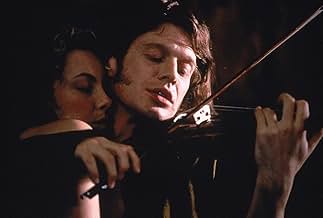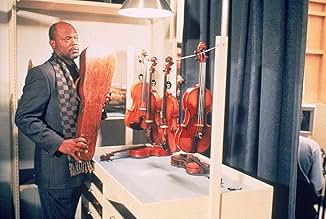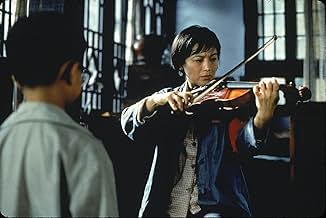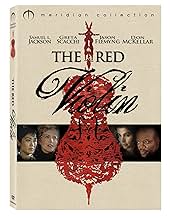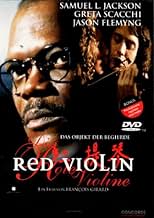Le violon rouge
- 1998
- Tous publics
- 2h 20min
NOTE IMDb
7,6/10
35 k
MA NOTE
Un violon de couleur rouge inspire la passion, traversant trois siècles à travers plusieurs propriétaires et pays.Un violon de couleur rouge inspire la passion, traversant trois siècles à travers plusieurs propriétaires et pays.Un violon de couleur rouge inspire la passion, traversant trois siècles à travers plusieurs propriétaires et pays.
- Récompensé par 1 Oscar
- 20 victoires et 19 nominations au total
Histoire
Le saviez-vous
- AnecdotesChristoph Koncz (as Kaspar Weiss the orphan virtuoso) was only nine years old when featured in this movie. He is an Austrian-Hungarian classical musician that became an internationally-renowned violinist and conductor.
- GaffesThe substance used to give the violin its color would not actually work in real life. The substance does not mix into varnish, and would quickly coagulate and oxidize to a dark brown or black color if it were actually used as the movie implies.
- Citations
Charles Morritz: What do you do when the thing you most wanted, so perfect, just comes?
- Bandes originalesO Richard! O mon Roi!
from "Richard Coeur de Lion"
Composed by André-Modeste Grétry
Commentaire à la une
I saw this film the same day it came highly recommended to me by a coffee shop friend who couldn't stop gushing about it. While this guy is also a member of the Academy and has steered me to some pretty good picks in the past, I walked into the theater fearing the usual letdown that invariably follows going into a film with overly high expectations (i.e. The English Patient, The Truman Show, etc.) This film not only managed to exceed my expectations, it restored my faith in the magic and mystery of cinema altogether.
We start with a rather simple but cleverly structured story about a very unique red violin that emblematically (and quite literally for that matter) takes on the heart and fate of a 16th century Italian woman as it passes across several centuries and continents on its way to the auction block in present day Montreal. The unfolding vignettes reveal more and more about the nature of this instrument and, when strung together in the bigger picture, play out like finely orchestrated movements of a great sonata; each movement plucking out its own stirring and poignant variation on theme. I was so swept up in the majesty and spectacle of this film that it didn't even occur to me until much later that the violin is nothing less than a personification of beauty itself (okay, okay, maybe I'm starting to overly deconstruct things here in retrospect, but the parallels are too perfect to remain unexplored). It's fascinating to watch both the transformative and destructive power of this beauty as it's placed into the hands of a sensitive young boy, a self absorbed musical protege, and a remorseful ring leader of a totalitarian regime. Much praise goes to director Francois Girard in how he refrained from overplaying the social and moral commentary, repeating this theme at mostly an emotional level rather than an intellectual one -- much in the same way that beauty itself, to some degree anyway, defies analytical discussion and belongs in the realm of pure and simple experience. You obviously can't dissect it, as co-writer Don McKellar¹s onscreen character thought to do, and so it remains as it was in it's original form: timeless, magical, elusive. The stuff that pompous nobility and rich collectors the world over will offer a king's ransom for and still never manage to posses in the end.
Performances were good to great all around. It's hard to go wrong with Samuel L. Jackson in a leading role and I appreciated the fact that the actors actually appeared to be playing the violin on camera, as opposed to watching the typical hokey cutaways and cheat shots often associated with onscreen musical performances; nauseating contrivances that always tear down the wall of suspended disbelief with a resounding crash. The costuming, set design and cinematography were absolutely stunning (Oscar nominations soon to follow I'm sure) without taking center stage from the story. I especially loved the amazing period recreations of China and Austria. I felt like I was fully transported in both space and time to these places and walking among people who really belonged there.
Overall I would rate this one as a true film classic on the level of masterpiece. Perhaps this is in part due to my love for music and the undeniable fact that, being the sentimental guy that I am, I'm always a sucker for haunting open-ended films like this where you leave the theater in a half daze, pondering all the implications, mesmerized by the lingering imagery. I'm still speculating about the future of Mr. Moritz and what will ultimately happen when beauty is placed into the hands of our modern world.
We start with a rather simple but cleverly structured story about a very unique red violin that emblematically (and quite literally for that matter) takes on the heart and fate of a 16th century Italian woman as it passes across several centuries and continents on its way to the auction block in present day Montreal. The unfolding vignettes reveal more and more about the nature of this instrument and, when strung together in the bigger picture, play out like finely orchestrated movements of a great sonata; each movement plucking out its own stirring and poignant variation on theme. I was so swept up in the majesty and spectacle of this film that it didn't even occur to me until much later that the violin is nothing less than a personification of beauty itself (okay, okay, maybe I'm starting to overly deconstruct things here in retrospect, but the parallels are too perfect to remain unexplored). It's fascinating to watch both the transformative and destructive power of this beauty as it's placed into the hands of a sensitive young boy, a self absorbed musical protege, and a remorseful ring leader of a totalitarian regime. Much praise goes to director Francois Girard in how he refrained from overplaying the social and moral commentary, repeating this theme at mostly an emotional level rather than an intellectual one -- much in the same way that beauty itself, to some degree anyway, defies analytical discussion and belongs in the realm of pure and simple experience. You obviously can't dissect it, as co-writer Don McKellar¹s onscreen character thought to do, and so it remains as it was in it's original form: timeless, magical, elusive. The stuff that pompous nobility and rich collectors the world over will offer a king's ransom for and still never manage to posses in the end.
Performances were good to great all around. It's hard to go wrong with Samuel L. Jackson in a leading role and I appreciated the fact that the actors actually appeared to be playing the violin on camera, as opposed to watching the typical hokey cutaways and cheat shots often associated with onscreen musical performances; nauseating contrivances that always tear down the wall of suspended disbelief with a resounding crash. The costuming, set design and cinematography were absolutely stunning (Oscar nominations soon to follow I'm sure) without taking center stage from the story. I especially loved the amazing period recreations of China and Austria. I felt like I was fully transported in both space and time to these places and walking among people who really belonged there.
Overall I would rate this one as a true film classic on the level of masterpiece. Perhaps this is in part due to my love for music and the undeniable fact that, being the sentimental guy that I am, I'm always a sucker for haunting open-ended films like this where you leave the theater in a half daze, pondering all the implications, mesmerized by the lingering imagery. I'm still speculating about the future of Mr. Moritz and what will ultimately happen when beauty is placed into the hands of our modern world.
- Sandman-40
- 18 juin 1999
- Permalien
Meilleurs choix
Connectez-vous pour évaluer et suivre la liste de favoris afin de recevoir des recommandations personnalisées
Détails
- Date de sortie
- Pays d’origine
- Langues
- Aussi connu sous le nom de
- The Red Violin
- Lieux de tournage
- Sociétés de production
- Voir plus de crédits d'entreprise sur IMDbPro
Box-office
- Budget
- 18 000 000 $US (estimé)
- Montant brut aux États-Unis et au Canada
- 10 019 109 $US
- Week-end de sortie aux États-Unis et au Canada
- 47 415 $US
- 8 nov. 1998
- Montant brut mondial
- 10 019 109 $US
- Durée2 heures 20 minutes
- Couleur
- Mixage
- Rapport de forme
- 1.85 : 1
Contribuer à cette page
Suggérer une modification ou ajouter du contenu manquant



